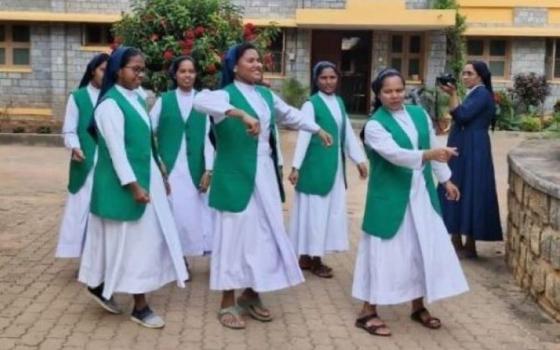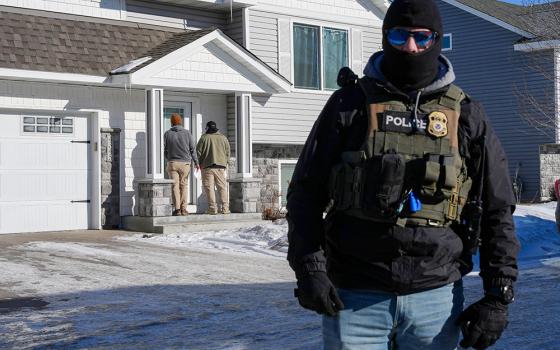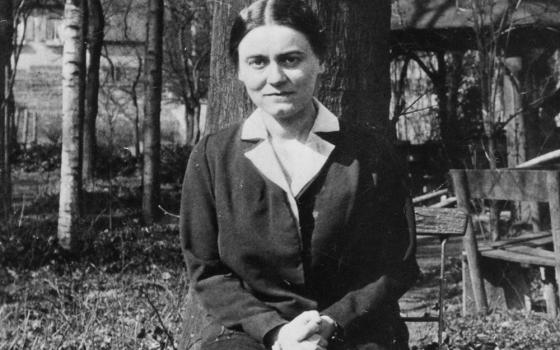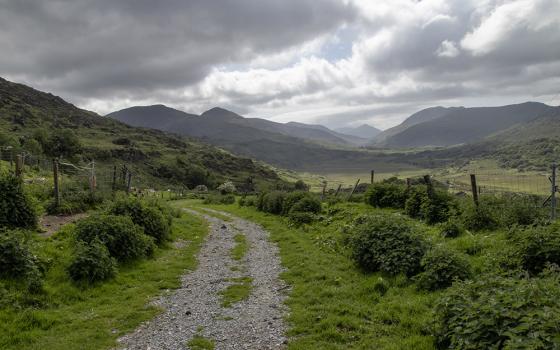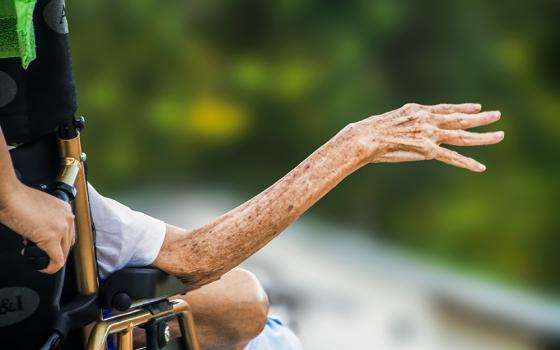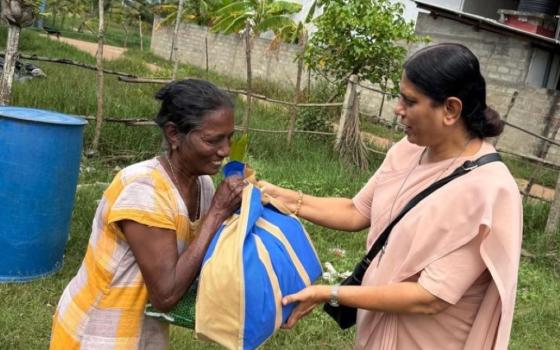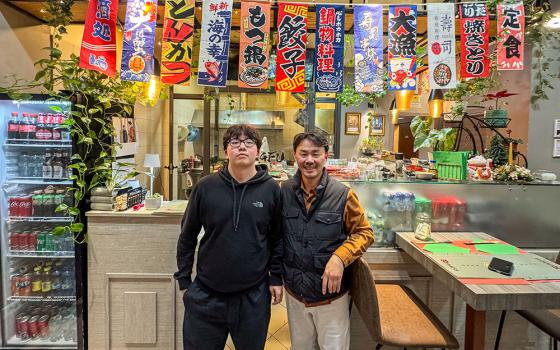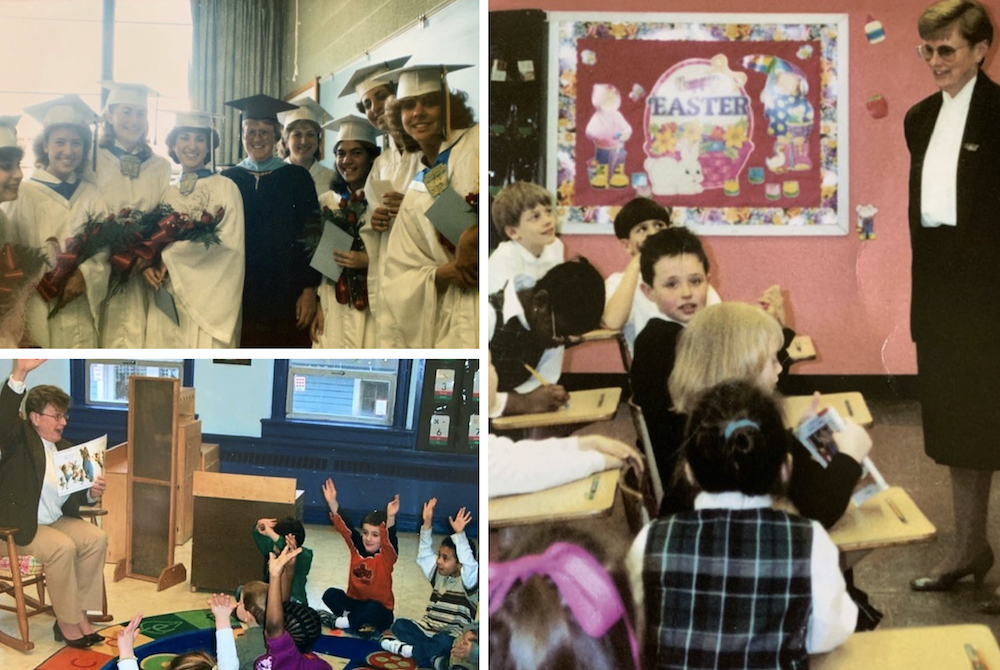
Top left: Sr. Jane Herb poses with students from her Advanced Placement calculus class at their June 1989 graduation from Marian High School in Bloomfield Hills, Michigan; bottom left: Sr. Jane Herb, then superintendent of Catholic schools in the Diocese of Albany, New York, reads to a kindergarten class in 2008 at St. Casimir School in Albany; right: Sr. Jane Herb visits a classroom as superintendent of Catholic schools in the Diocese of Albany, New York, in 2002. (Provided photos)
Sr. Jane Herb's lifetime in Catholic education has provided her with an innate understanding of complex systems and big-picture thinking, one she'll now put toward the ministry of national leadership as sisters contend with restructuring communities to fit their membership.
Herb, a member of the Sisters, Servants of the Immaculate Heart of Mary of Monroe, Michigan, was elected president-elect of the Leadership Conference of Women Religious on June 29, about six weeks before the conference's virtual assembly Aug. 12-14. She will join Sr. Elise García of the Adrian Dominicans, president, and Sr. Jayne Helmlinger of the Sisters of St. Joseph of Orange, California, past-president, in the shared "triumvirate" presidency representing communities making up 80% of U.S. women religious.
Before entering religious life in 1983 at age 30, Herb, also a lover of nature and camping, taught the full range of math, from the basics to calculus, at high schools. But a desire for community and attraction to the spirituality of the Sisters, Servants of the Immaculate Heart of Mary, often called by just the initials IHM, which sponsored one of the schools where she taught, drew her to the sisterhood.
As a sister, she became principal at Our Lady Star of the Sea High School in Grosse Point, Michigan, before earning a doctorate in educational administration from Boston College. She then served as superintendent of Catholic schools in the Diocese of Albany, New York, for 15 years.
In 2012 and again in 2018, Herb was elected to her congregation's leadership team.
Now, as she enters the LCWR presidency and reflects on the themes that arose in the annual assembly, Herb said she realizes that "the call to the future will require new ways of thinking," and perhaps the vessels that will take women religious there have "not yet been designed."
For the conference to address the "pandemic within a pandemic," as Helmlinger referred to racism amid the coronavirus in her presidential speech, Herb emphasized the need to "join together" as they respond to the Spirit.
"The core of all of us as women religious is to be present to a call, and how can we be witness to the Gospel in ways that our inner community, the boundaries, don't seem to be as pronounced."
Advertisement
GSR: I'm curious how entering religious life at 30 has affected your perspective on the vocation, coming into it already with life experiences and a more mature formation.
Herb: For me, I felt grounded in my ministerial experience, grounded in who I was as a Catholic school teacher.
The call was a desire, feeling that something was missing in my life. It was a call to find a community, such as the IHM sisters and their spirituality, and wanting to be part of a bigger picture of religious life and making a commitment that way.
It was a great shift for me during my foray into the community. I was pretty much living on my own, so being in community life all of a sudden was a learning experience for me. And yet, it was filling that piece of having a voice in our society that's larger than my own voice.
With all your years in education, tell me how your ministries have influenced either your leadership or your personal religious life. How do you connect that ministry to your vocation?
One of the hallmarks, if you will, of the IHM community is that we're founded as educators, and we say that even though we don't have many sisters involved in formal education, as such, we continue to be educators on so many different levels. Wanting to share that ministry of teaching and new ways of education really resonates with my experience. My time as principal and then superintendent has really enabled me to get experience of seeing the systems in place, if you will, and being able to look at the bigger picture and realize that through collaboration, the more we can do together, the stronger we will be.
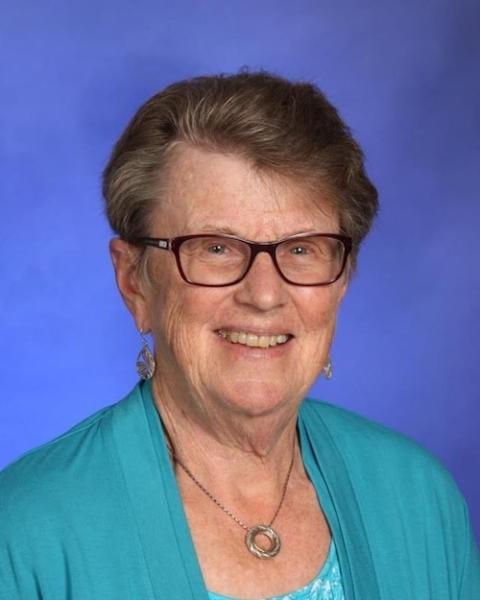
Sr. Jane Herb of the Sisters, Servants of the Immaculate Heart of Mary of Monroe, Michigan (Provided photo)
Moving on to your experience in leadership: How has the coronavirus affected your community, and in what ways has the leadership team had to step up to address it?
It's one of those things that you don't forget when you say yes to leadership, and you don't know what's going to come across your leadership term. And certainly, the global pandemic has really had an effect for our leadership team from the very beginning.
One of the challenges I have found is having a foot in both worlds. We are tending to the day-to-day of making sure we have all the protocols in place, and we are also planning for the future; specifically, carrying out the chapter directions of our congregation. It can be challenging, taking care of what needs to be done and yet carrying out the mission of the congregation, being that voice in our society, responding to the needs of the times.
Our priority was making sure our sisters are safe. We have a senior living community here, so our sisters have independent living, assisted living, and a skilled care unit that is licensed and has a residence, as well. I mention that because it really brings into the challenges that senior living communities face during the pandemic. We have an excellent staff that has really kept us on board with protocols and trying to keep our sisters safe.
The second priority was: How do we maintain a sense of community despite the social distance? We've looked for different ways to connect the sisters who don't live at the motherhouse with the sisters who live in the motherhouse during the months of the shutdown here in Michigan.
What are the lessons from leadership that you will take with you into the LCWR presidency or questions that remain?
Because I'm in my second term, I've been involved in Region 7 in LCWR [which includes Indiana and Michigan], and one of the biggest lessons I've learned is that collaboration is critical. Everybody's aware that our numbers are getting smaller, and this calls for what can we do together rather than individually.
I think in the early days, perhaps in the '60s, we had our communities and our ministries, and other communities had their ministries. Now, we might look at how can we minister together. That's important to the presidency of LCWR, and it is a movement that I believe is happening on a national level, on a global level.
When I was in my first term of leadership, I served as one of the delegates from the United States for the International Union of Superiors General, and that for me opened up a wider perspective and challenged me to look at a global perspective, and that's something I hope I can continue to look at and can move into the presidency.
What led you to keep your name in consideration for the nomination?
People nominate you, and I received some nominations in the past, but this time I really felt the call to serve in the presidency. I also served on the national board for a year before I was elected to leadership, so that helped me feel the call to be part of the national team and bring the gifts I have in administration and so on, but also really to bring people together and look at how we can look at the future of religious life together.
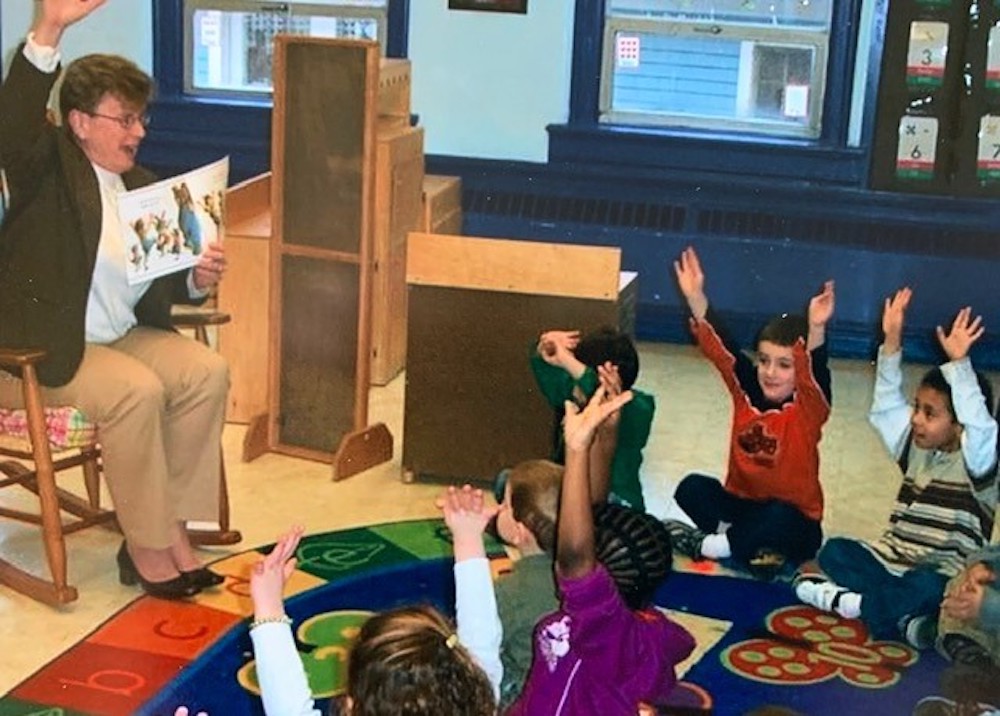
Sr. Jane Herb, then superintendent of Catholic schools in the Diocese of Albany, New York, reads to a kindergarten class in 2008 at St. Casimir School in Albany. (Provided photo)
When you're at your most creative or inspired, how do you imagine the role of sisters adapting to the times, given the pandemic, national politics, racial unrest and the state of religious life itself?
That's a critical question that we're facing, particularly with the political unrest and the issue of systemic racism, I think. First of all, the call to us as religious is to face our own complicity in terms of racism within our own congregations and within ourselves, individually. And I also think, how can we be a voice in the public square to speak out against some of the injustices in our society?
I think there's a real hunger in our society for that spiritual dimension. The LCWR commitment to contemplative dialogue is something that we can offer.
It's challenging for me at times, but, particularly with the election coming up, I feel a call to find a way to really listen to the other and really enter into conversations that's going to call for the best and different perspectives. How do we move forward with that?
What else would you like our readers to know about you?
I think nature has so much to teach. I used to go to the gym every morning, but now, I walk in the morning to experience nature unfolding the different stages. I think there's a lot of lessons to be learned by that, and as we enter autumn, what do we need to let go of and what can be understood in the beauty among different seasons?
When I look at this season of religious life, we can look at diminishment, but I don't think that's where we need to spend our time and energy.
One of the things most congregations are asking is: How do we reach out to not just devout religious, but the people who want to be with us, our associates, our co-ministers? We have a wonderful staff who continued with the IHM mission. How do we capitalize on that connection with the IHM mission and character? How do we come with the gifts of all for the purpose of really being a prophetic voice in our world?
[Soli Salgado is a staff writer for Global Sisters Report. Her email address is [email protected]. Follow her on Twitter: @soli_salgado.]

